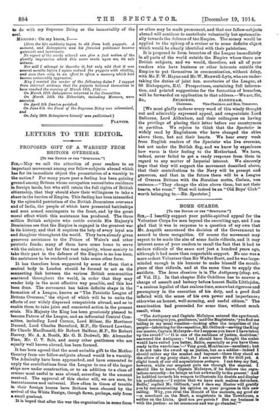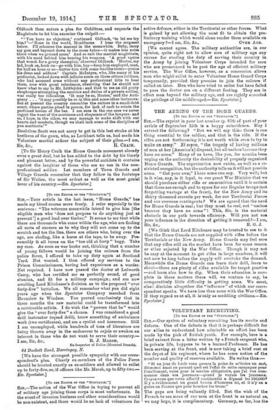HOME GUARDS.
[To TER EDITOR 07 MIR 4.srEcrwrorel Sra,—I heartily support your public-spirited appeal for the Volunteer Corps for men beyond the recruiting age, and I am glad that it was in response to a question of my own that Mr. Asquith announced the decision of the Government to accord to them recognition. Of course the movement may expect to be made the aim of some facile ridicule, and it may interest some of your readers to recall the fact that it had to endure ridicule of the same sort just a hundred years ago, although it had more than respectable support. No one was a more ardent Volunteer than Sir Walter Scott, and he was large- minded enough in his humour to make himself the mouth- piece of that ridicule, and at the same time to supply the antidote. The locus classicus is in The Antiquary (chap. xvi. of Vol. IL). In that chapter Edie Ochiltree has to answer a charge of assault and battery before honest Baffle Littlejohn, " a zealous loyalist of that zealous time, somewhat rigorous and peremptory in the execution of his duty, and a good deal inflated with the sense of his own power and importance; otherwise an honest, well-meaning, and useful citizen." The
examination had proceeded for some time, without much result, when
"The Antiquary and Captain McIntyre entered the apartment. 'Good morning to you, gentlemen,' said-the Magistrate; 'you find me toiling in my usual vocation—looking after the iniquities of the people—labouring for the respuldica, Mr. Oldbuck—serving theXing our master, Captain McIntyre—for I suppose you know I have taken up the sword ? It is one of the emblems of justice, doubtless,' answered the Antiquary : but I should have thought the scales would have suited you better, Bailie, especially as you have them ready in the warehouse.'—' Very good, Monkbarns—exoellent ; but I do not take the sword up as justice, but as a soldier—indeed I should rather say the musket and bayonet—there they stand at the elbow of my gouty chair, for I am scarce fit for drill yet. A slight touch of our old acquaintance podagra. I can keep my feet, however, while our sergeant puts me through the manual. I should like to know, Captain McIntyre, if he follows the regu- lations correctly—he brings us but awkwardly to the present.' And he hobbled towards his weapon to illustrate his doubts and display his proficiency.—' I rejoice that we have such zealous defenders. Bailie,' replied Mr. Oldbuck, 'and I dare say Hector will ;ratify you by communicating his opinion on your progress in this new calling. Why, you rival the liecatd of the ancients, my good sir —a merchant on the Mart, a magistrate in the Townhouse, a soldier on the Links. Quid non pro patria ? But my business is with the justice: so let commerce and war go slumber."'
Oldbuck then enters a plea for Ochiltree, and requests the Magistrate to let him examine the culprit :— "' You have no objection,' continued Oldbuck, 'to let me try him?'—' None in the world, Monkbarns. I hear the sergeant below. I'll rehearse the manual in the meanwhile. Baby, carry my gun and bayonet down to the room below—it makes less noise there when we ground arms.' And so exit the martial magistrate, with his maid behind him bearing his weapons. 'A good squire that wench fora gouty champion,' observed Oldbuck. 'Hector, my lad, hook on, hook on—go with him, boy—keep him employed, man, for half an hour or so—butter him with some warlike terms—praise his dress and address.' Captain McIntyre, who, like many of his profession, looked down with infinite scorn on those citizen soldiers, who had assumed arms without any professional title to bear them, rose with great reluctance, observing that he should not know what to say to Mr. Littlejohn : and that to see an old gouty shopkeeper attempting the exercise and duties of a private soldier, was really too ridiculous. 'It may be so, Hector, said the Anti- quary . . . 'it may possibly be so in this and some other instances: but at present the country resembles the suitors in a small-debt court, where parties plead in person, for lack of cash to retain the professed heroes of the bar. I am sure in the one case we never regret the want of the acuteness and eloquence of the lawyers : and so, I hope, in the other, we may manage to make shift with our hearts and muskets, though we shall lack some of the discipline of you martinets.'" Doubtless Scott was not sorry to get in this last stroke at his brethren of the gown, who, as Lockhart tells us, had made his Volunteer martial ardour the subject of their gibes.—I am,
[To Sir Henry Craik the Home Guards movement already owes a great deal, but he has added to the debt by his timely and pleasant letter, and by the powerful antidote it contains against the laughter of those who see no use in the non- professional soldier. Let members of Town Guards and Village Guards remember that they follow in the footsteps of Sir Walter, the most ardent as well as the most genial lover of his country.—En. Spectator.]







































 Previous page
Previous page